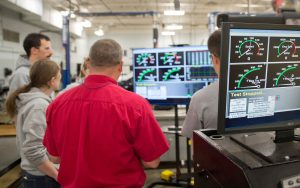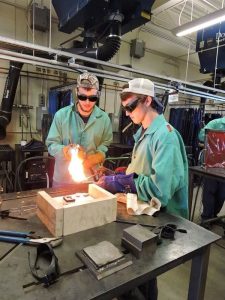COVID-19 forces community colleges to get creative for summer courses
By Tim Alexander for Chronicle Media — May 16, 2020
Instructors at Illinois Central College are going to “need to be creative” to be able to continue offering vocational classes such as automotive tech online instead of in person this summer, college officials said. (Photo courtesy of ICC)
Even in the COVID-19 era, the pursuit of higher education does not stop for central Illinois students at Heartland College in Normal, Lincoln College in Lincoln and Bloomington, and Illinois Central College in East Peoria and Peoria.
The following is a look at what these area junior colleges are offering in the way of summer educational courses:
ICC profs get creative
Illinois Central College (ICC), with physical campuses in East Peoria and Peoria, is offering the summer semester in an online format. All student support is online, from the bookstore to advising. The college transitioned over spring break to online to complete the spring semester and will continue for this summer, according to communications lead Kayla Thompson.
“We had to move quickly for the spring semester and use this time to develop an even stronger online offering for students this summer. All classes offered this summer that could be transitioned from face to face to online have been converted. The summer semester has a higher percentage of online classes historically, so the transition for ICC was not a heavy lift,” said Thompson.
When the shelter-in-place order is lifted, classes with hands-on learning requirements will be first priority as campuses are reopened, according to Thompson.
“ As you can see from our summer schedule (https://mymobile.icc.edu/app/catalog/classSearch/2211) we are still offering classes one would not expect, like Automotive Tech, Agriculture, and Welding,” she said.
ICC instructors have become innovative in order to find ways to teach face-to-face classes online. Professor Grant Grebner, ICC teaching chair of agriculture and livestock judging team coach, turned a routine veterinarian call into a remote learning experience for his students.
For his students’ practical example exercise, accounting professor Ray Kowalczyk used a box of Peanut M&M’s to create a video explaining the accounting terms of FIFO, LIFO, weighted average, and periodic.
“My students did surprisingly well with the transition. I’ve always told them that 66 percent of learning is done by them, not by me. I can only teach so much and then they must be proactive and stay caught up with their studying. In the online learning environment, it is really apparent,” said Kowalcyk. “Students who are the most interactive receive the highest grades. Their persistence and proactivity are rewarded.”
Adjunct faculty member Ralph Sawyer of the ICC Horticulture Department joined in creating online course materials for students. In what was his first semester of teaching the horticulture construction course, Sawyer spent hours recording and editing his videos for student learning, including instructional videos on building a timber wall and mortaring wall stone, and slideshows on building fences and other structures.
Students are also being innovative in their approach to learning. ICC Communication and Public Relations Professor Brent Goken said his Introduction to Communication students have been exceptionally creative. With their informative speech assignment due shortly after the online transition, Goken had students record speeches on fishing boats utilizing lures, rods, and other necessary fishing gear, among other creative presentations.
“The level of creativity left me in awe. They had fun during the unique circumstance and used everything they could muster to create amazing presentations,” said Goken. “It was the greatest gift I’ve been given during this pandemic — watching my students approach circumstances from a different lens — a creative one that inspired me to do everything I can to see them succeed. We are beating COVID-19 by advancing forward, and at ICC, our students are doing just that.”

Heartland Community College is working out how it can offer vocational classes, such as truck driving and welding, that require hands-on instruction, or classroom components and follow the state’s reopening Illinois policy. (Photo courtesy of Heartland Community College)
In addition to Goken, many other faculty and staff have reported students are doing well with the online transition at ICC, Thompson reported.
Heartland staying the course
Classes are online at Heartland Community College for the remainder of the spring academic term and for the summer academic term, according to Steve Fast, director of public information for Heartland.
“Our primary focus for summer is to maintain our courses 100 percent online. As we move forward and examine other potential options for specialized courses such as labs, we might have some ability to look into laboratory settings under appropriate social distancing measures. Right now, we are reserving the option to start up in-person sessions for very specific classes later in the summer semester,” he said.
Many programs offered at Heartland, such as truck driving and welding, require hands-on instruction, or classroom components, for completion.
“We are trying to figure out how to get those programs in a configuration that will fit the criteria of the (COVID-19 recovery) phase Illinois is in at the time, according to Reopen Illinois,” said Fast. “We are taking direction from the Illinois Department of Public Health as to what we can and can’t do at a particular time.”
Heartland College support services such as academic advising, success coaching, mental health counseling, tutoring, the library and other services are available virtually. In addition, high school GED and equivalency programs, and English as a Second Language, are being held online. In addition, Heartland’s roster of programs for the community will continue online, including Kids@Heartland, personal enrichment and professional development programs.
Heartland College leadership says it has been proactive in keeping informed and current on the latest information on the spread of COVID-19.
According to the college’s website, Heartland’s Safety and Security office has convened an Incident Management Team (IMT) composed of staff leadership in Health Sciences, Facilities, Public Information, Student Support Services, Human Resources, and Safety & Emergency Services, and others. The IMT has been monitoring the health risks of COVID-19, and keeping informed on the latest information from the Centers for Disease Protection, IDPH and the Public Health Departments in McLean and nearby counties.
The IMT provides regular briefings to Heartland’s leadership team, which will determine when in-person activities can resume on the campus, located at 1500 W. Raab Road.

Heartland Community College in Normal is still offering its youth enrichment classes this summer although they will be held online. For more information, go to https://www.heartland.edu/ and kids@Heartland page. (Photo courtesy of Heartland Community College)
“Once we know what we can do and when we can schedule things, we will announce it,” said Fast.
Heartland College services will remain available online and via phone. Call 309-268-8000 to connect with the College. For more information visit: www.heartland.edu.
Moving forward online
Lincoln College, with campuses at 300 Keokuk St. in Lincoln and 715 W. Raab Road in Normal, is also moving ahead with online summer courses.
The Lincoln Campus offers 12-week courses (beginning Monday, May 18) and the Normal Accelerated Bridged Education (ABE) program offers a full five-week semester.
“They are hybrid classes that are online but have a synchronous component, along with an asynchronous component,” said Vance Laine, executive director of the Lincoln College Normal Campus, meaning “Half of the class is online, and half the class is meeting one night a week for four hours via video conference.”
The Lincoln campus offers associate’s degrees to its students, while the Normal campus offers associate’s, bachelor’s and master’s degrees. Students can still apply to the Normal campus of Lincoln College, a private university, in time to enroll for ABE courses beginning June 8.
ABE courses are geared toward working adults, according to Laine.
A message on the college’s website reads: “Lincoln College will continue to provide updates to ensure the health and safety of our campus community as often as possible. The College will continue to make informed, emergency decisions, or modify existing plans, to best serve the Lincoln College community. We understand there may be new challenges for faculty, staff, and students, however, continuing to take the necessary precautions for our campus well-being is paramount at this time.”
Lincoln College has established a COVID-19 website with information that is regularly updated at https://lincolncollege.edu/covid19/. For more information on summer programming, call the College at 800-569-0556, or visit www.lincolncollege.edu.







